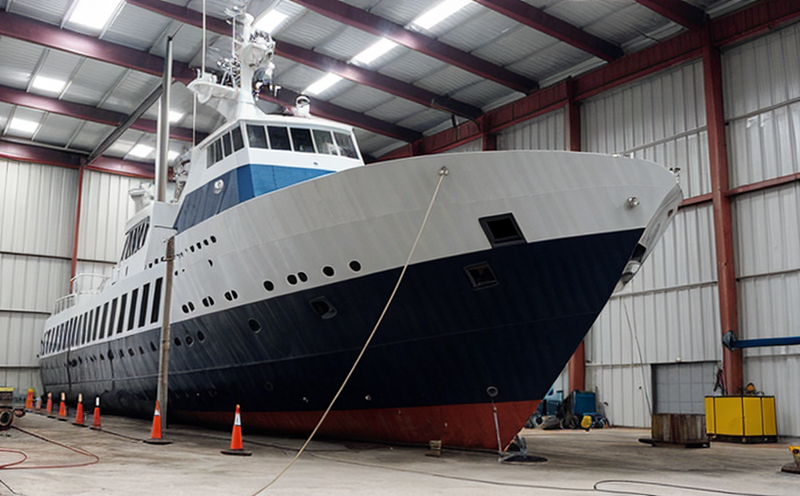Impact Resistance Testing for Marine Hull Structures
The Unyielding Challenge Ensuring Marine Hull Structures with Impact Resistance Testing
In the vast and unforgiving expanse of the ocean, marine vessels face an array of daunting challenges that can threaten their integrity and safety. Among these perils is the risk of impact damage, which can arise from a variety of sources, including collisions with other ships, debris, or even sea creatures. To mitigate this risk, maritime businesses must ensure that their vessels hull structures can withstand such impacts without sustaining significant damage.
This is where Impact Resistance Testing for Marine Hull Structures comes into play a crucial laboratory service provided by Eurolab that helps businesses safeguard the structural integrity of their vessels against impact-related damage. In this article, we will delve into the importance and advantages of using this testing method to ensure the safety and reliability of marine hull structures.
The Importance of Impact Resistance Testing for Marine Hull Structures
Marine vessels operate in a highly dynamic environment where they are constantly exposed to potential hazards that can compromise their structural integrity. According to the International Maritime Organization (IMO), collision damage is one of the most significant threats to ship safety, accounting for up to 50 of all reported incidents.
Impact Resistance Testing for Marine Hull Structures is an essential tool in assessing a vessels ability to withstand such impacts without sustaining critical damage. This testing method simulates real-world impact scenarios, allowing businesses to evaluate the structural robustness and resilience of their vessels under various conditions.
Advantages of Using Impact Resistance Testing for Marine Hull Structures
Enhanced Safety By evaluating the impact resistance of marine hull structures, Eurolab helps businesses ensure that their vessels are designed and built with safety in mind. This reduces the risk of accidents and ensures compliance with international regulations.
Improved Durability Impact Resistance Testing enables businesses to identify potential weaknesses in their vessels design or construction, allowing them to make informed decisions about upgrading or modifying their hull structures for improved durability.
Reduced Maintenance Costs By identifying areas of vulnerability before they become major issues, businesses can proactively schedule maintenance and repairs, reducing the likelihood of costly downtime and extending the lifespan of their vessels.
Compliance with Regulations Eurolabs Impact Resistance Testing services ensure compliance with international standards and regulations governing ship safety, including those set by the IMO, ISO, and other industry leaders.
Informed Decision-Making With accurate data on impact resistance, businesses can make informed decisions about vessel design, materials selection, and operating procedures to optimize performance and reduce risk.
Key Benefits of Eurolabs Impact Resistance Testing for Marine Hull Structures
Comprehensive Service Eurolab offers a comprehensive range of testing services tailored to the specific needs of marine hull structures, including drop weight impact testing, compression after impact (CAI) testing, and more.
Advanced Equipment and Expertise Our state-of-the-art equipment and experienced team ensure accurate and reliable results that meet or exceed industry standards.
Customized Testing Solutions We work closely with clients to develop customized testing programs that address their unique needs and regulatory requirements.
Rapid Turnaround Times Eurolab provides expedited testing services, ensuring that businesses can access critical data quickly and make informed decisions about their vessels design and operation.
Frequently Asked Questions (FAQs)
What types of vessels can benefit from Impact Resistance Testing?
All marine vessels, including tankers, bulk carriers, container ships, cruise liners, and more.
How does Eurolab conduct Impact Resistance Testing for Marine Hull Structures?
We use a range of testing methods, including drop weight impact testing, compression after impact (CAI) testing, and other specialized techniques to simulate real-world impacts.
What are the regulatory requirements for Impact Resistance Testing in the marine industry?
Eurolabs services ensure compliance with international standards and regulations, including those set by the IMO, ISO, and other industry leaders.
Can I schedule an appointment or request testing at my facility?
Please contact us to discuss your specific needs and requirements.
Conclusion
In a world where safety and reliability are paramount, Impact Resistance Testing for Marine Hull Structures is an indispensable tool in ensuring the integrity of marine vessels against impact-related damage. By partnering with Eurolab, businesses can trust that their vessels will meet or exceed international standards for safety and durability. Contact us today to learn more about our comprehensive testing services and take the first step towards safeguarding your vessels future.
About Eurolab
Eurolab is a leading provider of laboratory services dedicated to delivering accurate and reliable results for the marine industry. With a commitment to excellence, cutting-edge equipment, and expert expertise, we help businesses ensure the safety and performance of their vessels through Impact Resistance Testing for Marine Hull Structures and other specialized testing methods.




